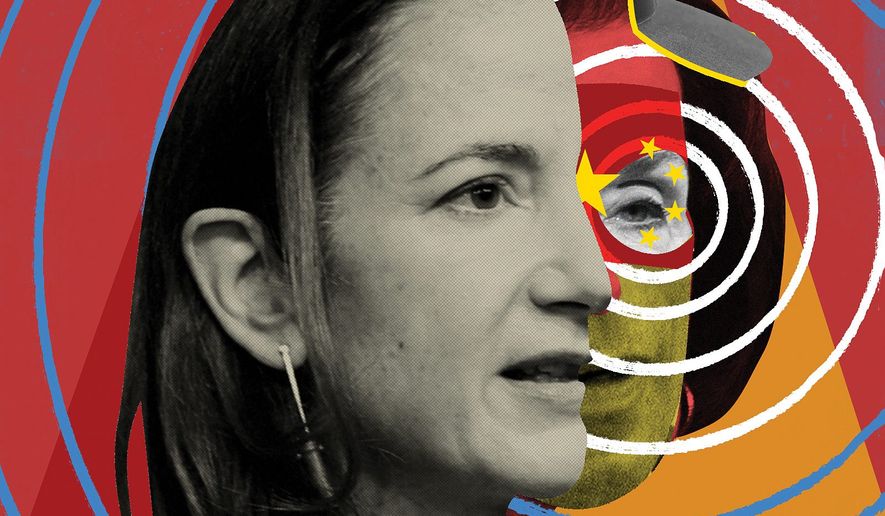OPINION:
CIA veteran Avril Haines is President-elect Joe Biden’s choice to be the next director of National Intelligence. If confirmed, she will be confronted with the problems that plague congressional oversight of the intelligence community. Chief among them are leaks, old age and China.
Because members of Congress are constitutional officers they do not require security clearances in order to obtain access to classified information. The executive branch has no say in which senators and congressmen are members of the Senate and House Permanent Select Committees on Intelligence (“SSCI” and “HPSCI.”) Those members, especially the chairmen and ranking minority members of those committees, are privy to the most highly-classified intelligence information.
Sen. Dianne Feinstein, at 87, is the oldest serving senator. She was SSCI chairman from 2009 to 2015 and remains its ranking Democratic member.
Ms. Feinstein reportedly is suffering major cognitive dysfunction, perhaps due to Alzheimer’s disease. This reportedly results in her increasing inability to remember who spoke to her, to whom she spoke or what was said.
We must sympathize with Ms. Feinstein, but she obviously can no longer be trusted with classified information. Ms. Feinstein should be removed, immediately, from the SSCI. Senate Minority Leader Chuck Schumer is reportedly concerned about Ms. Feinstein’s condition, but he has not removed her from the SSCI.
Ms. Feinstein, and another California Democrat, Rep. Eric Swalwell, are primary examples of how China is relentlessly spying on and trying to suborn congressional members and their staffs. Congress is, after all, a great neighborhood for spies because it is vulnerable and populated by liars, leakers and too many who are more interested in appeasing adversaries such as China than they are in our national security.
For about 20 years, including most of the time she was SSCI chairman, a staffer in one of her California offices was both her liaison to the Chinese-American community and her driver. He also had a second job: He was an agent of China’s Ministry of State Security (MSS): i.e., a Chinese spy. Ms. Feinstein reportedly fired him in 2013 after the FBI warned her about his second employer.
Mr. Swalwell has, unfortunately, been a member of the HPSCI since 2015. He is hyper-partisan and not the sharpest knife in the drawer. Those are not politically-sufficient reasons to throw Mr. Swalwell off the HPSCI. His other conduct is.
Mr. Swalwell reportedly had a years-long affair with Christine Fang, an attractive Chinese lady who also happened to be an agent of China’s MSS.
Mr. Swalwell claims that he shared no classified information with Ms. Fang and ended the affair in 2015 after an FBI warning about Ms. Fang’s affiliation with the MSS.
Ms. Fang reportedly fled the U.S. shortly after the FBI briefed Mr. Swalwell. That raises the question of why she wasn’t apprehended and prosecuted or turned into a double agent. The answer may be that the FBI simply blew it. Or was it that congressional Democrats pressured the FBI to let her go because they wanted to protect Mr. Swalwell?
House Speaker Nancy Pelosi will not remove Mr. Swalwell from the HPSCI. On Dec. 9, she said that she has full confidence in him.
Mr. Swalwell’s conduct and Mrs. Pelosi’s statement highlights one of the principal problems with congressional oversight of the intelligence community: Congress’ vulnerability to espionage and its consistent practice of protecting members who are unworthy of being trusted with the nation’s secrets.
The best way to handle Mr. Swalwell’s situation is to have the FBI investigate whether any classified information was compromised because of his affair with Ms. Fang. But such an investigation is impossible without her evidence. The only choices are for Mr. Swalwell to resign from the HPSCI — which he won’t — or to throw him off, which Speaker Pelosi won’t do.
The 1947 National Security Act provides that Congress is to be kept “fully and currently informed” of significant intelligence activities. The intelligence community does this with frequent briefings either to both Senate and House Permanent Select Committees on Intelligence or in briefings limited to the “Big Eight,” the Senate majority leader and ranking minority member of the Senate, the House speaker and the chairmen and ranking minority members of the intelligence committees.
That worked well until the past four years when leaks from these briefings became common. On Aug. 29, Director of National Intelligence John Ratcliffe informed congressional leaders that they would no longer get in-person briefings on election security because of “… unauthorized disclosures of sensitive information.”
As Mr. Ratcliffe explained the following day, “Within minutes of one of those briefings ending, a number of members of Congress went to a number of different outlets and leaked classified information for political purposes.” He added that his intention was to stop “a pandemic of information being leaked out of the intelligence community.”
In a Dec. 3 Wall Street Journal op-ed, Mr. Ratcliffe said that China was the greatest threat to the United States. China’s interwoven layers of China’s intelligence activities in the United States meant to steal national security secrets by invading every part of American society especially our vulnerable Congress.
If she becomes DNI, Ms. Haines can work hard to deal with Congress’ vulnerabilities as Mr. Ratcliffe has done or she can turn a blind eye to them. The latter is far more likely.
• Jed Babbin, a deputy undersecretary of Defense in the George H.W. Bush administration, is the author of “In the Words of Our Enemies.”




Please read our comment policy before commenting.